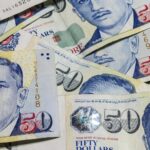US dollar tumbled to almost one-month lows against the Japanese yen on Monday, as the greenback was put under pressure ahead of Federal Reserves policy meeting, starting tomorrow, while uncertainty over the central banks Quantitative Easing was growing.
USD/JPY fell to its lowest point during the current session at 97.62 at 2:20 GMT, which was also the lowest since June 25th, after which consolidation followed at 99.98. The pair was likely to receive support at June 25th low, 96.96, while resistance was to be encountered at June 24th high, 98.70.
“The FOMC statement may reflect the recent slowdown in the U.S. economy,” Shinichiro Kadota, a strategist for non-yen debt at Barclays Plc in Tokyo, wrote in a report to clients today, as imparted by Bloomberg. “Should expectations of the Fed’s stimulus reduction be pushed back further or economic data disappoint, the dollar will likely face further downward pressure.”
At the same time, on Monday an official report said that Japanese retail sales rose by 1.6% in June on annual basis, marking its second consecutive yearly gain, despite the fact that results remained below projections of a 2.1% increase. The climb in sales was a result of higher demand for summer clothing, due to high temperatures, and also because of the higher gasoline prices. Sales of consumer electronics showed signs of revitalization during the same period, following the continuous drops in the preceding months. To sum it all up, consumer spending gave support to Japanese economy, while expectations of a stable recovery were still present.
Earlier today it also became clear that Bank of Japan Governor Haruhiko Kuroda encouraged the government to reduce the large public debt, stating that the two-step sales tax increase would not inflict major damage to countrys growth and struggle with deflation. Speaking at the Research Institute of Japan, Kuroda stressed that fiscal consolidation would play a vital role in preserving interest rates on low levels, while the large financial stimulus suppressed long-term interest rates increase. Kuroda in April introduced an unprecedented monetary stimulus in order to rekindle inflation. Today in Tokyo, he also warned that Japanese economy was still on its way to achieve a stable 2% rate of inflation, despite the growing consumer expenditures.
Even with a tax raise, Bank of Japan still expected that the real gross domestic product will expand by 1.3% during the fiscal year starting in April, according to the median estimate of the nine policy board members, released earlier in July, Bloomberg reported.
Meanwhile, The MSCI Asia Pacific Index of stocks decreased by 1.4%, while the Topix index of Japanese shares submerged 2.8%, giving further boost to Japanese yens demand.
Elsewhere, the yen advanced against the euro as well, with EUR/JPY cross decreasing by 0.28% to 130.03 at 8:07 GMT. GBP/JPY also erased 0.28%, trading at 150.67 at 8:09 GMT.
Later in the trading day, the United States was expected to release data on pending home sales, which will give clues, regarding future activity in US housing market.





